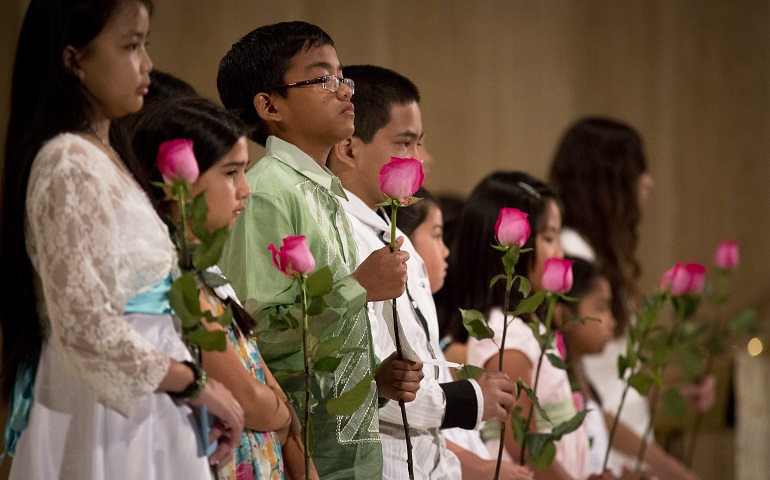
Filipino children participate in the annual National Filipino Pilgrimage at the Basilica of the National Shrine of the Immaculate Conception in Washington June 28, 2014. (CNS photo/Tyler Orsburn)
Just when I think I'm part of the "us," I get reminded that I'm still part of the "them."
I have dedicated my life to listening to and living out the good news that is filled with peace, joy and freedom. My students know that the work of justice is about "just us." I question them, "So, who is the us we are talking about?"
Though we make an effort to be inclusive of all, we continually draw a line between us and them out of habit, fear, and the need to make sense of my life, my privilege, my wealth, my opportunity.
Growing up as a first-generation, first-one-in-my-family-born-in-the-United States, Filipina-American, San Francisco and Catholic church native helps me see the world in a certain way from where I stand. In all honesty, I did not realize that my perspective could have been much different from others’. I had not made the connection that others may think I am odd or deficient relative to their experience. I did not really understand the depth of this perspective until just a few years ago.
I was running late to a meeting during my clinical pastoral education residency when my supervisor asked, "Do you think your culture impacts your relationship with time?"
I remember pausing to gain clarity, but all I could think of was my college coach making fun of me on the first day of tryouts because I did not find the field on time: "Watch that Sideco. She runs really fast because she's a Filipina, always running late. You know how these people of color are."
Do I think my culture impacts my relationship with time? I suppose so. I find myself in situations where building relationships is good, and cutting people off in a conversation is bad. I was taught to always have more food prepared for others than have less or even just enough. So I would spend time, lots of it, preparing food for others. I was taught to respect my elders by greeting them hello and goodbye each time I visit, making the departure from a cousin's house a longer process than I initially think it would be.
And yet, this question does not seem neutral. There is a judgment. The color I bring to the world is different and may, in fact, be unwanted. My relationship with time is different from how others relate to time, namely, they show respect by being on time. Perhaps "Be there or be square" meant that if I did not show up in a certain way, I would not be understood.
This may seem a minor point, but I came to understand myself and the world I live in differently as I sat in the discomfort with my supervisor.
I saw myself, my very human being, as persistently on the outside looking in, waiting for the invitation to be a part of what's really going on with the real people that it's going on with. And now I can see how this oppressive narrative keeps me bound.
In Maureen Fielder's latest post, she raises the question, "How do we treat people who are different from ourselves?"
Good question. For me, as a person of color, I am used to code-switching in a way that routinely reminds me that I am the other or the different one that people are referring to. The people who are most different from me are privileged, predominantly white, and have a difficult time hearing the metaphorical bassline and moving to the rhythm of the beat. The people who are different from me traditionally have held the positions of power and privilege.
How do I treat them? With much patience and kindness. I also try to offer them the benefit of the doubt in situations where who they are may limit how they can understand a situation.
But I have moments where I hit a limit and resent this reality of "us" and "them."
I listened to a colleague invite our staff to persist in the growing of a cultural imagination by listening to the experience of those other than ourselves. I didn't realize it at the time, but I felt disoriented and confused as a person of color in a predominantly white culture, where all I've been doing is try to interrupt the meta-narrative with explosions of color, personality and generosity to help grow some other person's imagination as large as my own, as large as my imagination already had to have been for me to navigate the myriad of glass doors, potholes and dark alleys we name as the American way.
We are living in a hyper-racialized society where people from traditional minority groups are almost outnumbering the majority culture. I feel for Mexican migrants, Muslims and African-Americans who constantly have to prove they are "good Americans." And proving themselves to outlandishly brash wannabe leaders simply is insulting. I resonate with the complicated relationship between citizenship, culture and true freedom to pursue what exactly makes us happy.
Maybe I'm overcomplicating matters. Maybe I'm not. Maybe it's worth figuring out whether or not I consider myself on the inside of this grand circle of understanding or on the outside.
When we hear the stories of Jesus, where do we place ourselves? Are we the sinner who lets herself into Simon's house only to collapse to the floor in order to bathe Jesus's feet with her tears? Or are we afraid to admit we are Simon, blind to the practice of hospitality when we think we are in control of a situation?
Do we imagine ourselves to be the person beaten by robbers, or the priest, or the Levite, or the Samaritan?
Being "in" gives us power, security, identity. But there are blind spots -- we forget what it feels like to be "out" or powerless, in danger, or even so different that you are unrecognizable.
So, like I try to get my students to understand, whether or not we consider ourselves in or out, perhaps we ought to take a moment to consider which direction we are facing in order to bring about God's dream for the world. If we're standing on the margins, at the edge of being let in of left out, do we persist to turn around and notice that there may be yet another who may be in need of our care and attention?
That is the real challenge. And let us remember that we are always in the holy presence of God.
[Jocelyn A. Sideco is a retreat leader, spiritual director and innovative minister who specializes in mission-centered ministry. She directs the Community Service and Social Justice office at St. Ignatius College Preparatory in San Francisco. Visit her online ecumenical ministry, In Good Company, at ingoodcompany.net.co or email her at jocelyn@ingoodcompany.net.co.]
Editor's note: We can send you an email alert every time a Young Voices column is posted to NCRonline.org. Go to this page and follow directions: Email alert sign-up.


